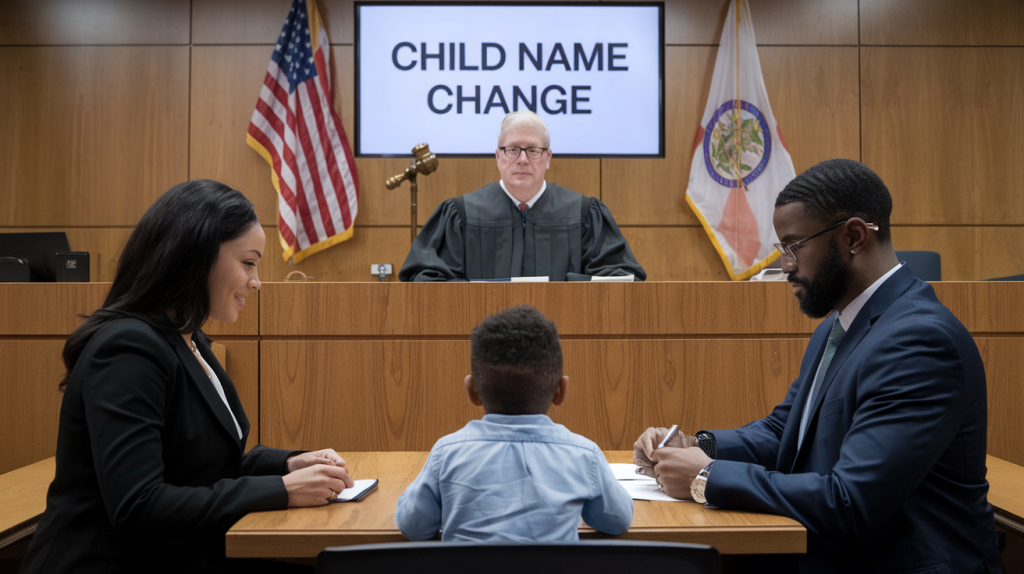You stare at your child’s birth certificate, knowing the name on paper doesn’t match your family’s reality. Maybe your little one uses a different last name at school.
Or perhaps you’re tired of explaining why your kid’s name differs from their siblings.
The Florida courts understand these situations. But here’s the thing – they need proof that changing your child’s name will improve their life. Not just any reason will do.
Let’s walk you through five reasons that Florida courts take seriously when parents ask for name changes.
By the end of this post, you’ll know exactly what makes the courts say “yes” to these requests.
Understanding the Legal Process
The legal name change process follows specific steps that vary by state. Most courts need you to file a petition with your current name and the name you want. You must give good reasons for wanting to change your name.
Overview of the Legal Steps Involved in a Name Change

Getting your name changed needs several steps through the court system. Here’s what you need to know about the process:
- File a Petition: The first step starts with filling out court forms. You must submit a name change petition at your local courthouse. This form asks for your current name, desired new name, and reasons for the change.
- Background Check Requirements: Most courts want to see your criminal history before approving a name change. You’ll need fingerprints and background checks from state and federal agencies. This helps courts make sure you’re not trying to avoid legal problems.
- Court Hearing: After filing papers, the court sets up a meeting with a judge. The judge asks questions about why you want to change your name. They ensure you’re not trying to trick anyone or run from debt.
- Public Notice: Many states ask you to put an announcement in the local newspaper. This tells people about your plan to change your name. The notice runs for a set time, often a few weeks.
- Final Court Order: When the judge accepts your request, you get a court order. This paper proves your new name is legal. You can use it to update your:
- Social Security: The card needs an update first. When you get your court order, visit the Social Security office to make this change. This helps with all your other updates.
- Driver’s license: Take your court order and updated Social Security card to any Florida DMV office. You’ll need these to prove your name change.
- Passport: You’ll submit forms to the U.S. Department of State. Include your court order and current passport when sending your application.
- Bankaccounts: Visit your local branch with your court order and new ID. They’ll help update all your banking information.
The Role of the Court and Necessary Documents

The court serves as the official authority in handling legal matters. Legal cases need specific papers for proper processing. The clerk’s office checks all documents before accepting them for filing.
Required documents often include:
- A formal request to the court, known as a petition
- Papers that show proof of important facts
- Forms filled out with personal details
- Records of past events related to the case
The court staff helps make sure each paper meets basic rules. They look at dates, names, and other details. But they cannot give legal advice about what to write.
Most courts now take both paper and online files. Each court has its own list of needed documents. Getting these papers ready takes time and careful work.
The court keeps track of all papers in a case file. This file becomes the official record. Missing or wrong documents can slow down the process.
Reasons to Change the Name
Parents choose to change their child’s name in Florida for many family and personal reasons. Let’s look at the common situations:
1. Parental Divorce or Separation

After a divorce or separation, a parent may seek to change the child’s last name to reflect their own or to sever ties with the other parent.
This is often done to strengthen the bond between the child and the custodial parent or to reduce any negative emotional impact associated with the previous family structure.
In Florida, both parents must consent to the name change, or the court will decide if the change is in the best interest of the child.
2. Adopting a Child

When a child is adopted, it is common for their name to be changed to reflect the new family.
This can include both the last name and possibly the first and middle names, depending on the parents’ wishes.
In Florida, once the adoption is finalized, the adoptive parents can file a petition to change the child’s name as part of the adoption process, ensuring that the new name matches the family structure.
3. Name Mismatch or Error

Sometimes, a child’s name may be misspelled or incorrectly registered at birth, such as a clerical error.
If the name on official documents does not match the child’s intended name, a parent can petition the court for a legal name change to correct the error.
This process ensures that the child’s name is consistent across all legal and personal documents.
4. Parental Consent and Agreement

If both parents agree, they may decide to change the child’s name for reasons that benefit the family.
This could be for cultural, religious, or personal reasons, such as honoring a family name or aligning the child’s name with the parent’s heritage.
In Florida, both parents must sign off on the name change unless one parent has sole custody or the other parent cannot be located.
5. Protecting the Child’s Well-being

A name change may be necessary in certain situations to protect a child’s emotional or physical safety.
This could include cases of domestic violence, harassment, or where the child is being targeted because of their current name.
If a child is in danger or suffering from emotional distress due to their name, a court may approve a name change to help protect the child’s well-being and sense of security.
Note: There can be many reasons for changing a child’s name in Florida, be it due to a change in family structure, correcting an error, or the safety of the child.
It’s important to understand the legal process and consult an attorney to ensure the change is handled properly.
Conditions to File for a Change of Child’s Name in Florida
When parents want to change their child’s name in Florida, they need to follow specific steps. Let us know the following steps:
First, you must get these papers ready:
- Both parents must sign a form to agree to the name change. If one parent doesn’t agree, you’ll need to explain why to the court.
- You need to show proof of where you live in Florida. Your child must live here too.
- Get a copy of your child’s birth certificate. Make sure it’s an official copy from vital records.
- Fill out Form 12.982(c). This is the main form to ask for the name change.
Second, you should know about some other key items:
- The fee to file is about $400. Each court might charge a bit more or less.
- Your child needs to have lived in Florida for at least six months.
- You’ll have to pass a background check. The court wants to make sure there are no legal issues.
- The judge might ask you and your child to come to court to explain why you want the change.
Remember that if you’re a single parent, you must try to tell the other parent about the name change. The court will want to know you made this effort.
Benefits of Hiring a Name Change Lawyer

Getting a name change in Florida can feel hard if you try to do it alone. A lawyer knows Florida’s name change rules inside out.
They will help you fill out all your papers the right way. I’ve seen many people make small mistakes that slow down their cases.
A lawyer saves you time and stress. Instead of reading lots of legal papers, you can focus on your daily life. Your lawyer handles the court dates and deadlines.
They tell you about all costs upfront, so no hidden fees will catch you off guard.
Your privacy stays safe with a lawyer, and the court process moves quickly. They know which forms to file and when to file them.
They can speak up for you if any problems come up during your case.
Conclusion
Changing a child’s name in Florida needs proper planning and understanding. Every choice about your child’s name matters for their future.
Before approving any changes, the courts look at safety, stability, and the child’s best interests.
Before you file papers with the court, make sure you meet the legal rules. Look at your reasons and gather proof to support your case.
Want to make this process smooth? Talk to a family lawyer who knows Florida’s name change laws.
They’ll help you gather the right papers, guide you through each step, and help in a smooth process.
Frequently Asked Questions
Can I Change My Child’s Name Without the Father’s Consent in Florida?
Getting court approval needs solid proof of how it helps your child. The legal system prefers both parents to agree on this choice.
How Much it Costs to Change a Child’s Last Name in Florida?
Basic court costs run $400-$450, plus $30 for prints and $100-$200 for paper notices. Without a lawyer, expect to pay $550-$700 total.
How Can a Child’s Best Interest be Argued for a Name Change?
Show how it makes daily tasks smoother at school and doctor visits. Bring notes from teachers about issues, and show if other kids share the planned name.








